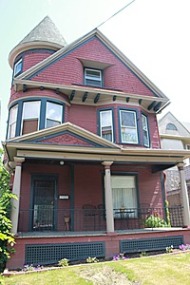 My nephew just sent me a real estate listing from our old home town. By first accounts, the house in question, a classic 1850s Victorian, promised vintage charm — original hardwood floors, large living and dining rooms, stain glass windows, library, etc. — in a quiet, well-kept location. Enchanting.
My nephew just sent me a real estate listing from our old home town. By first accounts, the house in question, a classic 1850s Victorian, promised vintage charm — original hardwood floors, large living and dining rooms, stain glass windows, library, etc. — in a quiet, well-kept location. Enchanting.
But then this:
Slightly haunted. Nothing serious, although, e.g., The sounds of phantom footsteps. A strange knocking sound followed by a very quiet (hardly noticeable, even) scream at 3:13 am, maybe once a week. Twice a week, tops. And the occasional ghastly visage lurking behind you in the bathroom mirror. Even still, this occurs very rarely and only in the second floor bathroom.
And farther down:
Large unfinished crawl space behind concealed door hidden in bedroom closet. Very strange area but perfect for storage.
My first thought was that my own visage in the bathroom mirror is ghastly enough, especially at 3:13 a.m. (The horror…)
Then I wondered what kind of self-respecting, chain-rattling spirit worries about waking the neighbors so much that it restricts its knocking and “hardly noticeable, even” screaming to “twice a week, tops” at an hour when most of the living would likely sleep right through it.
And what about that storage space behind a concealed door in a “very strange area”? That couldn’t have been built just to stow granny’s rhubarb preserves.
Finally, I thought, the ad might be a Halloween prank or, more likely, some homeowner pitching a locale for one of the reality TV ghost shows—Ghost Hunters, Ghost Adventures, Kardashian Ghost Vacations, etc.
Whatever it was, it didn’t look like a winning sales strategy. How many folks are actively seeking habitats that come with bumps, shrieks, and ghastly mugs in the mirror? So, why add these features to a public listing?
A good question. So I decided to check what realtors think about phantoms roaming the corridors, and I learned some surprising legal and other facts.
Don’t hide the bodies
First, murder in a house, whenever it occurred, must be part of the public record, and shared with any potential buyer.
Other known deaths in the house must also be disclosed by the seller, but only if they occurred within three years of sale time.
Hauntings are a little trickier. While, the owner need not by law divulge the spooky presence, most realtors advise the seller to come clean, if nothing else to avoid later fright-induced lawsuits.
However, a haunted house then falls into the category of “stigmatized property,” which may send the would-be buyer running for holy water.
So, in most cases it’s probably going to be a hard sell, calling for specific strategies.
The first step is to discuss with your realtor and perhaps your lawyer what state laws require you to disclose. As mentioned, even without legal compulsion, most realtors advise sellers to tell potential buyers about the oddities, especially if neighbors already know about the oddities. Most buyers will not take kindly to finding this out after the sale.
If, on the other hand, your house has been wrongly accused of spookery, through rumor or tradition, then the wiser course is to discuss it openly with realtors and would-be buyers, even to the point of holding open house or brokers’ parties to show that it’s just a normal house, so let’s —ha-ha!—put those silly stories to rest.
But what if you’ve really got a poltergeist problem? Then what?
Well, you may consider dropping the price another 20-25 percent.
Or, it could be time to call in, yes… ghost busters.
Being dead explains a lot
Many sellers opt to bring in spirit chasers, such as priests or other spiritual persons, to cleanse the house. Or they may hire serious professionals such as HouseHealing.com, a real estate consultancy devoted to ridding residential and commercial properties of the late-of-life.
The head of HouseHealing, David Franklin Farkas, has been communicating with ghosts since he was a young man. He says that ghosts are just like us, only confused.
“Many have stayed behind because they believe they have unfinished business… or unresolved feelings. But most ghosts don’t even know they’re dead, or once they do know, they may not have the energy to leave.”
Mr. Farkas says that during one of his first conversations with a ghost, he asked the spirit if he knew that he was dead. The answer? “Well, that would explain a lot.”
Despite the concerns, some realtors believe that a haunting can actually boost sales potential among special buyers, if you market it as a unique house with a distinct history. A ghostly presence in the house has already proved irresistible for certain Goths, coffee bar fops, faculty loungers, and artsy poseurs.
My nephew who sent the listing, a practical lad of twenty-something, thinks most of these strategies waste everybody’s time, money, and mental equilibrium. Instead, he opines that in such cases the seller’s best house liquidation strategy should begin with matches and a can of gasoline.
Kidding… I think.